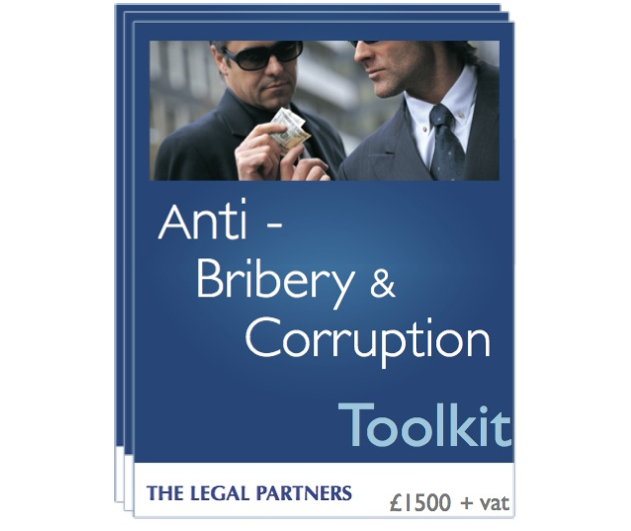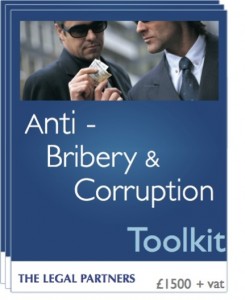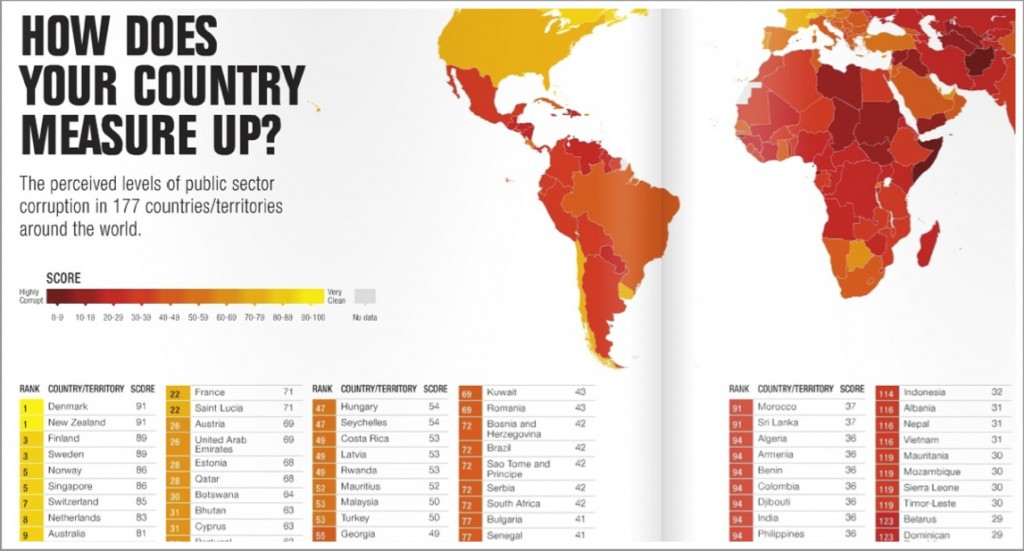The UK Bribery Act 2010 made Company Directors legally responsible for bribery in their organisations, and personally liable for not preventing it.
In recent years global organisations such as Avon, Glaxo China, BAE Systems and Rolls Royce have fallen foul of the Serious Fraud Office investigations and paid millions in fines on Bribery and Corruption charges. In 2016, for the first time a UK company Smith and Ouzman and it’s Directors were handed a £2.2m fine and 4 1/2 yrs (suspended) after being found guilty of bribing foreign agents, following a 4-year investigation by the SFO. The length of this investigation and the sentencing of a “typical UK SME” rather than a global corporation sends a strong message to UK companies of every size.
Being smaller and less resourced counts as neither excuse nor protection.
For UK Directors, being unprepared means being vulnerable.
Is your business protected and prepared for the Government’s zero tolerance on Bribery?
Anti-Bribery & Corruption Toolkit
We have created and Anti-Bribery and Corruption Toolkit to help you minimize Bribery and Corruption Risks and show that your business has taken “adequate procedures” which could be a defence to any Bribery Act liability.
The Anti-Bribery & Corruption Toolkit includes:
- Board Memorandum for your Board to adopt as the evidence that the Board has considered the Anti Bribery and Corruption issue & taken action
- Staff Anti–Bribery and Corruption policy to be inserted in the Staff Handbook. This will assist your business with adequate training in meeting the “adequate procedures defence” to a bribery offence committed by one of its employees/workers
- Bribery Act 2010: Anti-Bribery and Corruption and Statement of Ethics Code to be added to tender documentation for public and private sector contracts, passed to agents, distributors to show the overall policy, to put on your web site
Plus - One hour’s legal review of the Company’s Due Diligence Process with its agents & distributors and other high risk third parties.
The Toolkit is priced at £1,500 plus VAT, a huge saving on GSK’s £300m fine.
Contact me directly at Richard.mullett@thelegalpartners.com or on 0203 755 5288.
What is bribery and corruption?
The Bribery Act makes it a criminal offence anywhere in the world for UK residents, nationals and UK companies or overseas companies operating in the UK to give or receive a bribe.
What constitutes a bribe?
Broadly, the Bribery Act 2010 defines bribery as giving or receiving a financial or other advantage in connection with the “improper performance” of a position of trust, or a function that is expected to be performed impartially or in good faith.
Bribery does not have to involve cash or an actual payment exchanging hands and can take many forms such as a gift, lavish treatment during a business trip or tickets to an event. Some examples are:
- bribery in order to secure or keep a contract
- bribery to secure an order
- bribery to gain any advantage over a competitor
- bribery of a local, national or foreign official to secure a contract
- bribery to turn a blind eye to a health safety issue, or poor performance, or substitution of materials or false labour charges
- bribery to falsify an inspection report or obtain a certificate
What does the UK Government advise businesses to do about Bribery & Corruption?
The UK Government website states that UK companies should
1 have an Anti Bribery and Corruption policy for staff and separate Ethics policy for agents and distributors.
2 provide their staff with regular training on Bribery & Corruption, so the whole business understands what behavior and activities constitute Bribery & Corruption, and what action must be taken if it occurs.
3 monitor and review regularly what is happening within the business and amongst its agents and distributors.
Our business only operates in “safe” countries, so what is the problem?
No country is completely free of corruption, as demonstrated by this infographic published as part of Transparency International’s Corruption Perception Index
This is one of the key authoritative external sources on Bribery and Corruption world wide. Businesses and organisations use the Index to find out which are the high risk countries. You may be surprised to see what are perceived as safe countries appearing lower down on the list than expected. The UK is listed in 14th place.
What are the likely fines for Bribery and Corruption?
Fines for companies are likely to be substantial, as proved by the GSK case in China. No guidance has yet been given, but a judgment in the UK Crown Court in 2010 against a company that had bribed foreign public officials stated that fines for corruption should be in the tens of millions or more.
Who enforces the Bribery Act? Who will raid our offices?
The Serious Fraud Office (SFO) enforces the Bribery Act.
The SFO priorities are not to punish those who are trying to be ethical but to work with organisations to help overcome difficult issues and problems. Their priority is those who have no procedures to prevent bribery, or those whose procedures are purely a paper exercise who have no real intention of stopping bribery.
As a Director, what is my personal position with regards to Bribery and Corruption in my organisation?
As CEO or CFO, you will be expected to have:
- appointed a compliance officer
- followed the 6 “core principles” – see below – and implemented them. This will prove to the SFO and any court that your business had adopted “adequate procedures” to prevent Bribery and Corruption and so protect you against a Bribery & Corruption charge.
A director will have committed a crime under the Bribery Act where he/she is deemed to have given his/her consent or connivance to:
- giving or receiving a bribe or
- bribing a foreign public official.
Critically, it is possible that a court could regard failing to act to prevent Bribery as consent or connivance and this could lead to directors being prosecuted, fined and/or imprisoned.
A director convicted of a bribery offence is also likely to be disqualified from holding a director position for up to 15 years.
A “Senior officer” (which is broadly defined under the Bribery Act and includes directors) can also be convicted of a Bribery offence.
Bribery is bad for business, morally wrong and not worth taking the risk.
SFO guidance has stated that if a Director is aware of unethical conduct, he/she should try and change the organisation’s approach to doing business fairly. Failing that he/she should seriously consider resigning.
What can a business do to minimize liability under the Bribery Act?
More than ever, SMEs can expect that their large customers will conduct due diligence on their business and supply chains to ensure they are complying with anti-bribery and corruption compliance.
The Ministry of Justice (the UK government Department which is responsible for the implementation and monitoring of the Bribery Act) has published guidance on what adequate procedures might involve. The 6 steps recommended by the UK Ministry of Justice are set out in its guidance document.
Bribery Act; summary of the 6 core principals:
- Proportionate procedures.
- Top level commitment.
- Risk assessment.
- Due diligence.
- Communication.
- Monitoring and review.
The Legal Partners have produced this Toolkit to help you minimize Bribery and Corruption Risks and show that your business has taken “adequate procedures” which could be a defence to any Bribery Act liability.
Contact me at Richard.Mullett@TheLegalPartners.com or call 0203 755 5288 for more information and also if you need due diligence or training on a particular Anti Bribery & Corruption area.








